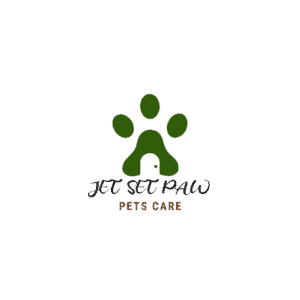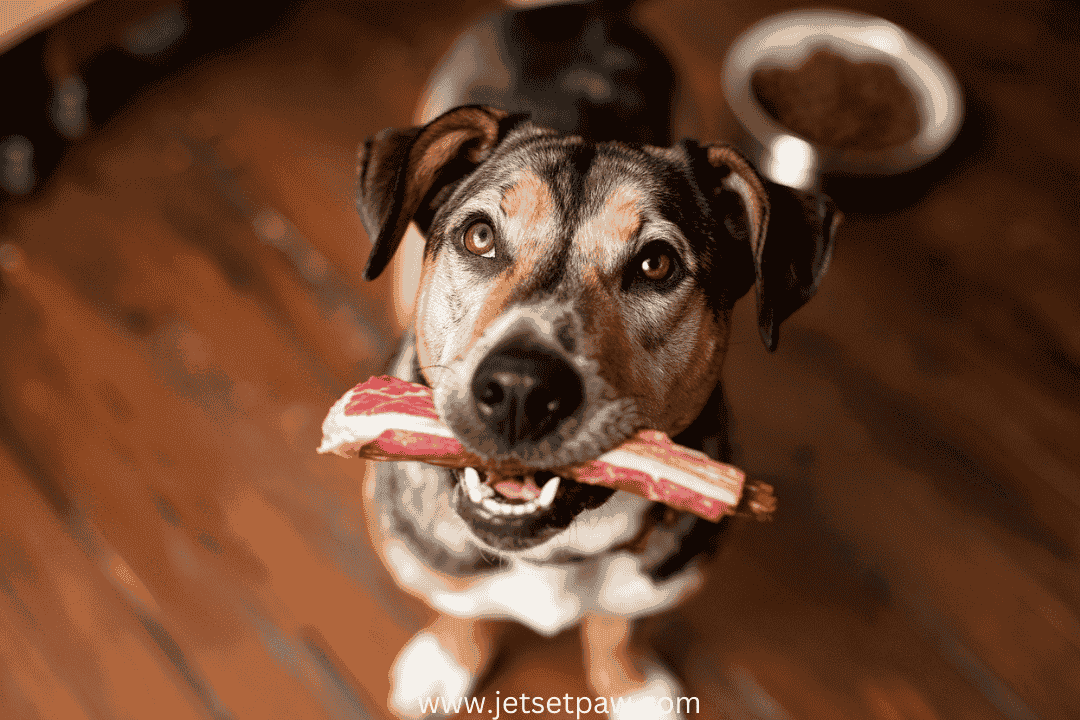We’ve all experienced it – you fill your dog’s bowl with their favorite kibble, set it on the floor, and instead of scarfing it down they start batting pieces around with their nose.
Some dogs will even take mouthfuls of food and carry it to another location before eating it. Why does our canine companion play with their food instead of just eating it? This seemingly silly behavior has some interesting explanations.
When your dog pushes their bowl around the kitchen or living room like a hockey puck, they’re communicating something.
Understanding the possible reasons behind this behavior can help you address any underlying issues and encourage better mealtime manners from your pup.
In this article, we’ll explore the main theories behind why dogs play with their food and when it might be a cause for concern.
Exploring Theories
Why does my dog play with his food? There are several possible reasons dogs engage in this behavior:
Hunting Instinct
One theory is that playing with food appeals to a dog’s basic hunting instincts. In the wild, dogs needed to catch their food by hunting and foraging.
Playing with kibble activates their prey drive and satisfies their innate desire to “catch” their food. It allows them to engage with their meals more naturally.
Anxiety
In some cases, anxiety may lead a dog to play with their food. The unfamiliar environment of a shelter or boarding facility can cause stress that exhibits itself during mealtimes.
Anxious dogs may be too worked up to focus on eating, and rather fidget with their food as a nervous outlet. The same may apply to recently adopted dogs still adjusting to a new home.
Marking Territory
Spreading food around can also be a form of marking territory. By scattering their food, dogs are essentially claiming that area with their scent.
This gives them a sense of ownership over their eating space. It’s not uncommon for dominant or possessive dogs to push their food bowls around for this purpose.
Hunting Instinct
Many experts believe that playing with food ties back to our dogs’ hunting origins. In the wild, dogs needed to hunt for their meals. Their survival depended on stalking prey, playing with it, and killing it.
Domesticated dogs retain some of these instincts handed down from wolves and other wild canine ancestors.
Playing with food satisfies their primal urge to forage. It allows them to mimic ancestral behaviors of catching, killing, and eating their “prey.”
Your dog may see their kibble or canned food as prey to be toyed with and batted around. Pouncing on and mouthing their food gives dogs an enriching mental and physical outlet to exercise their inherent hunter drive.
They are simply practicing ingrained behaviors passed down over thousands of years – just on modern-day dog food instead of actual quarry.
Boredom
Dogs play with their food when they are understimulated and looking for mental enrichment. If your dog seems restless or unfulfilled, he may see mealtime as an opportunity to make things more exciting.
An under-exercised or bored dog is more likely to play with his food out of a need for activity and mental stimulation.
He may roll the kibbles around, hide them under his bedding, or even throw them into the air. This provides a sense of fun and entertainment for a dog lacking adequate outlets to expend his energy.
To curb food playing due to boredom, be sure your dog gets plenty of exercise and playtime. Take long walks, play fetch, or try dog sports like agility to tire him out mentally and physically.
Also, rotate through puzzle feeders or stuffed Kongs to engage his natural foraging instincts and make mealtimes more mentally enriching.
A dog with his needs sufficiently met will be less inclined to play with his food out of boredom.
Anxiety over Stress, Changes, and Separation
It’s natural for dogs to feel anxious at times. Stress, changes in routine, or separation from their owner can trigger anxiety that leads to food playing.
Dogs are creatures of habit and can become distressed by unexpected changes. Switching food brands, moving homes, adding a new pet, or disruptions to their daily walk schedule can induce stress. Dogs may play with their food as a self-soothing behavior when feeling uncertain.
Separation anxiety is another common source of stress. Dogs that are very bonded to their owner can panic when left alone.
To relieve tension, they may paw at their food bowl, scatter kibble, or carry mouthfuls of food around. This distracting activity helps comfort dogs missing their owner.
Other stressors like construction noise, guests visiting, or a family member’s absence can also provoke anxious dogs to play with their meals.
If an underlying stressor is suspected, try minimizing triggers to see if food playing dissipates. Keeping your dog’s environment and routine consistent will help avoid anxiety.
Marking Territory
Dogs have an excellent sense of smell, so leaving their scent on objects is an important form of communication.
When your dog plays with his food but doesn’t eat it, he may be using his saliva to mark the food as his possession and leave his scent on it.
This sends the message that the food belongs to him and deters other dogs from trying to take it.
By scattering his food around, your dog is spreading his scent and indicating that the area around the bowl is his territory.
He’s saying “This is my space, don’t come near it!” This territorial marking reinforces his status and lets other pets know that he claims ownership over this food.
It’s a non-confrontational way for dogs to define boundaries and avoid conflicts over resources. So rather than a sign of misbehavior, your dog playing with his food can be an instinctive territorial behavior.
When It’s Problematic
While some dogs playing with their food is harmless behavior, it can become problematic in certain situations. Here are some potential issues to watch out for:
Overeating
Dogs playing with their food can sometimes lead to overeating. As they bat their food around and nibble at it over a long period, they may end up consuming more calories than necessary.
This can cause weight gain and obesity over time. If your dog is becoming overweight, reducing food play time may help curb overeating.
Food aggression
Some dogs may start resource-guarding their food and showing food aggression if they are used to playing with it for long periods.
Food aggression is a serious issue that should be addressed with training. You may need to separate your dog from their food bowl while they eat to prevent food-guarding behavior.
Digestive issues
Batting food around scatters it all over, resulting in the dog’s eating area becoming messy and unsanitary. Eating food off the floor can cause digestive upset in some dogs due to excess bacteria ingestion.
Dogs playing with their food also tend to eat more slowly. This can lead to increased swallowing of air which may cause gassiness or bloating.
Stop the Behavior
If you want to curb your dog’s food-playing behavior, there are some techniques you can try:
–Provide More Exercise: Make sure your dog gets plenty of exercise and physical activity. A tired dog is less likely to have excess energy that leads to playing with their food.
Try taking your dog for longer or more frequent walks, going for a jog together, playing fetch, or getting them a puzzle toy that dispenses treats when manipulated. Physically tiring them out can curb the urge to play.
-Use Food Puzzles: Food puzzle toys that make your dog “work” for their food by rolling, toggling, or sliding parts around can keep them engaged and entertained at mealtime.
The mental stimulation could satisfy your dog’s playful instincts so they don’t feel the need to bat their kibble around. This is a great solution for smart, energetic breeds.
–Try Scheduled Feedings: Free-feeding allows your dog to graze all day, leading to boredom and food playing. Feed your dog scheduled meals 2-3 times a day instead.
They may anticipate mealtimes more and be less inclined to play with their food in between. Stick to a consistent feeding routine.
Getting exercise, doing food puzzles, and scheduling feedings can all help diminish your dog’s urge to play with their meals. Consult a vet or animal behaviorist if these techniques don’t work.
Some dogs play with their food compulsively or due to anxiety, which requires professional intervention. But for most dogs, lifestyle changes curb the behavior.
Seeking Veterinary Care
Though playful behavior with his food is usually normal for a healthy, happy dog, there are some circumstances where a veterinary visit is warranted.
If the food playing is accompanied by other symptoms like lethargy, vomiting, diarrhea, weight loss, excessive thirst/urination, or sudden behavior changes, it could signify an underlying medical issue requiring veterinary attention.
Some potential medical causes include:
- Dental disease – If playing with food seems to be related to mouth pain. The dog may be reluctant to chew and is essentially “playing” by licking at the food or breaking it into smaller pieces. This warrants a dental exam by your vet.
- Gastrointestinal issues – Diseases like inflammatory bowel disease or food sensitivities can cause nausea, pain, or malabsorption during eating. The dog may be pushing food around due to these discomforts.
- Neurological problems – Disorders affecting the brain, inner ear, or nerves can impair coordination, proprioception, vision, etc., making it difficult for the dog to grasp and eat food normally.
Schedule a non-emergency vet visit to discuss your concerns. Be prepared to provide a history of when the behavior started, how often it occurs, what the dog’s appetite is like, and any other relevant symptoms.
The vet will likely do a physical exam and recommend further testing like bloodwork, imaging, or endoscopy to pinpoint the problem.
Addressing any underlying medical issue will not only alleviate the food play behavior but also provide appropriate treatment for your dog’s health and comfort.
Conclusion
Dog owners need to understand why their dogs might be playing with their food. As we discussed, most experts believe dogs play with their food due to instincts, boredom, anxiety, or as a way to mark their territory.
While it’s normal for dogs to play with their food on occasion, excessive playing can lead to behavioral issues or point to an underlying health problem. That’s why owners must pay close attention to any changes in their dog’s eating habits.
If a previously well-behaved dog suddenly starts playing aggressively with their food, it could signify boredom, stress, or anxiety that needs to be addressed.
Persistent playing with food can also lead to resource guarding over time. And if your dog stops eating altogether, it’s important to rule out potential medical issues by taking them to the vet.
The reasons behind this behavior are complex, but understanding the potential causes can help owners better meet their dog’s needs.
By keeping our dogs mentally and physically stimulated, sticking to a consistent feeding routine, and creating a relaxing environment at mealtimes, we can curb excessive food play while strengthening the bond with our furry best friends.

